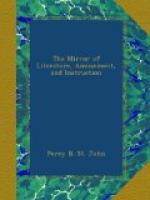[1] We thank our correspondent for the above communication on one of the most interesting phenomena of British geology; for, as we hinted in our last, the pleasantest hours of our sojourn at Margate, about three years since, were passed in the watchmaker’s museum, nearly opposite the Marine Library, which collection contains many Sheppey fossils, especially a prawn, said to be the only one in England. We remember the proprietor to have been a self-educated man: he had been to the museum at Paris twice or thrice, and spoke in high terms of the courteous reception he met with from M Cuvier; and we are happy to corroborate his representations. With respect to the reptile, or, as we should say, insect, alluded to in the preceding letter, we suppose it to have been a vermicular insect, similar to those inhabiting the cells of corallines, of whose tiny labours, in the formation of coral islands, we quoted a spirited poetical description in No. 279 of the mirror. Corallines much resemble fossil or petrified wood; and we recollect to have received from the landlady of an inn at Portsmouth a small branch of fossil wood, which she asserted to be coral, and that upon the authority of scores of her visiters; but the fibres, &c. of the wood were too evident to admit of a dispute.
* * * * *
ANTICIPATED FRENCH MILLENNIUM, OR THE PARISIAN “TRIVIA.”
(For The Mirror.)
“Travellers of that
rare tribe, Who’ve seen the countries
they describe.”
HANNAH
MORE.
When daudling diligences drag
Their lumbering length along[2]
no more—
That odd anomaly!—or wag
Gon call’d, or coach—a
misnomer[3]—
That Cerberus three-bodied! and
That Cerberus of music!
Such rattle with their nine-in-hand!
O, Cerbere, an tu sic?
When this, (and of Long Acre wits
To rival this would floor
some!)
When this at last the Frenchman quits.
Then! then is the age d’or
come!
When coxcomb waiters know their trade,
Nor mix their sauces[4] with
cookey’s;
When John’s no longer chamber maid,
And printed well a book is.
When sorrel, garlic, dirty knife,
Et cetera, spoil no
dinners—
(The punishment is after life,
Are cooks to punish sinners?)
When bucks are safe, nor streets display
A sea Mediterranean;[5]
When Cloacina wends her way
In streamlet sub-terranean.
When houses, inside well as out,
Are clean,[6] and servants
civil;[7]
When dice (if e’er ’twill
be I doubt)
Send fewer—to the
devil.
When riot ends, and comfort reigns,
Right English comfort[8]—players
Are fetter’d with no rhythmic[9]
chains—
French priests repeat French
prayers.[10]




